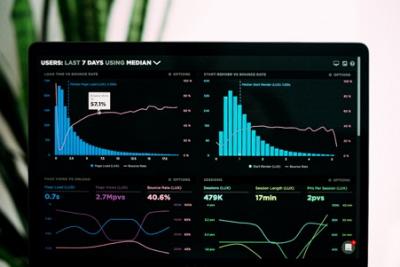The swift advancement of data availability and data science have made the word analytics very appealing nowadays. Businesses have been going head-over-heels after it, and every organization is looking to incorporate analytics into their operations. Even though business analytics has been around for a very long time now and it’s not a new concept for businesses, the rise of analytics tools in the previous decade has turned things around by a lot and changed the way we look at business analysts.
In a nutshell, business analytics refers to collecting, managing, and processing business data to analyze customer behaviors and market trends. Business analytics makes organizations more data-driven in their approaches such as decision-making and marketing strategies etc.
Not only is this helpful in coming up with more informed policies, but it also helps target the customer segments more specifically.
However, that’s not all; there are countless reasons why business analytics is vital to every business. As a saying by a fictional character Gordon Gekko goes,
“The most valuable commodity I know of is information.”
Moreover, Gartner suggests that
“By 2022, 90% of corporate strategies will explicitly mention information as a critical enterprise asset and analytics as an essential competency.” So, let’s explore further and see why business analytics is all about why there’s so much to it.
What is business analytics?
Business analytics is essentially a sweet combination of data analytics and economics. It uses the tools and algorithms of data analytics to study business data in detail to find patterns and trends to make important decisions specific to a business.
It’s a tricky field since it requires in-depth knowledge of both data science and economics.

Every company nowadays has lots of data stored about their customers, their behaviors, etc. Business analytics lets them collect all this data, process it, such as cleaning and wrangling it, and finally doing the exploratory analysis.
After that, the data can be turned into useful bits of information, which can be used by the organization to predict customers’ behaviors or changing market trends.
Here comes the tricky part, to study the results of analytics technically and draw the conclusion, you require appropriate knowledge of the business world and how things go about in a business. Merely getting done with the analytical part isn’t all that’s required.
This is exactly where the line between data analytics and business analytics is drawn. If you’re also one of the people who’re confused about the difference between business analytics and data analytics, don’t forget to read our blog on it here which will clear up all your doubts.
Highly Recommended Next Articles to Read:
Data Analytics Vs. Business Analytics: Top 5 Differences (find out!)
Can a Data Analyst Become a Business Analyst?
Why is Data Visualization Important in Data Science?
Will Algorithms Erode our Decision-Making Skills?
Why is Business Analytics Vital to Every Business?
Businesses run by selling their goods and services to the customers, and the first step in this process is to know the needs of the customers.
Once you figure out the customers’ needs, you can provide them the value they’re looking for. This requires having a threshold level of knowledge about the customers, which is only possible through collecting enough data.
While business analytics certainly makes it very easy for a business to collect lots of information from different sources and combine it, it’s not impossible without using it.
Far before the advent of data science, businesses have mostly had data regarding their customers.
So, what makes business analytics so special? Is it necessary for a business to thrive? Does it play a vital role in a business? Well, the most straightforward answer to this is yes, it does. Let’s see why.
Business analytics isn’t just limited to data collection and processing. Even though businesses can handle and manipulate data without business analytics, there’s a huge amount of data being generated nowadays, nothing like before!
Such vast amounts of data cannot be dealt with using simple tools and non-technical professionals not specializing in business analytics. Even if they give it a shot, a lot of data would be going to waste as there’s a lot of hidden information in big data that would be unable to be picked up by non-analytic personnel.
How Does Business Analytics Add Value to a Business?
It should be pretty clear to you by now that business analytics certainly has a vital role to play in a business.
Consequently, business analysts play a pivotal role in the advancement of every business, defining their vision and mission statements, goals, and so on. Now, let’s jump on to some of how business analytics add value to an existing business.
- Decision Making
Decision-making is one of the most important pillars of a business, irrespective of what domain a business might be in.
While the decision making was handled by the top-tier personnel in organizations and was dependent on nothing more than their instinct and experience, it’s no more the case now, at least for the bigger organizations out there.
Times are changing fast; experience doesn’t come in very handy when making important decisions that might affect the company’s future, and there’s a lot to put at stake when a decision is based on a mere instinct.
The future is data-driven decision-making (DDDM), and business analytics is the phenomena that act as its backbone.
Data-driven decision-making is essentially about backing up your decisions with data and not just making them ignoring the facts and figures being suggested by the data.
Business analysts are responsible for preparing the summaries and analyzing the data to help the organization make informed decisions while keeping every aspect of the business in mind related to making a specific decision.
Data-driven decision-making is a proven way to help organizations capture more customers and develop better marketing strategies, product designing, etc. A survey conducted by Mckinsey Global Institute showed that data-driven organizations are 23 times more likely to acquire customers.
Highly Recommended Article:
13 Reasons Why Data Is Important in Decision-Making
- Customer experience
Customers are the key to success for every business, and losing even a single customer due to inefficient customer experience is a huge loss to a company, no matter how trivial the customer might be.
There are ample reasons why customer experience should be the top priority of a business. Hence excelling in the customer experience department is what sets a business in the right direction.
Since business analytics lets you study data individually for each customer, you can customize every customer’s experience without much hassle. You can track the activities of your customers on your website and estimate their purchasing habits.
It helps to restructure your website according to your customers’ needs and continue to make it better.
Personalization is another thing made possible by using business analytics tools. It helps build a one-to-one personal relationship with every customer; it helps to build a trust level of the customer and eventually leads to brand loyalty.
- Efficiency
First off, let me clear a widespread misconception that an organization’s efficiency is only limited to its employees. Well, it’s not. There are many other ways where a business can be more efficient and use its resources in better ways than its currently doing so and take its productivity to the next level.
Business analytics boosts the efficiency of an organization in multiple ways. When you’re using business analytics in running your business, everything will be under the radar. You’ll have your eye on every resource and how it’s being utilized, which isn’t always the case in big organizations unless there’s a lot of human resources hired.
However, in ‘manual’ management, which is the conventional and still the most used approach, a lot of un-needed resources are put into places where they aren’t needed. This not only puts an extra burden on the business in terms of expenses, but it also causes scarcity of resources in places where they’re needed.
Using data analytics would help you keep everything under control, and you won’t have to face unnecessary expenses. This might not sound like a big deal on paper, but the numbers will start speaking for themselves once you get this going.
- Dealing with Big Data
As we’ve previously seen in the article, data generation is increasing at an exponential rate, and it’s expected to follow a similar path in the future as well. So, with all the incoming data available on the internet, it’s challenging to keep up with it unless you’re using big data tools, which are a part of business analysts’ jobs.

These tools help you go through millions of bytes in a very short period, and while doing that, they also help you catch minor trends and patterns available in the data, which might be of great use to you in the form of hidden opportunities.
It’s perfectly fine to deal with data manually, and simple manipulation/exploratory analysis could do the job of finding patterns and details in it.
The big data tools, mentioned above, are built for such purposes, so they’re capable of saving a whole lot of time. Again, this is quite relevant to the organization’s efficiency since it saves quite a lot of human resources and helps you study market trends and accurately analyze customer behaviors.
Final Remarks
In this growing world of data, business analytics has become crucial in every business, playing a vital role in its core operations. Business analytics is a wide field that comprises a variety of tasks that include collecting data and storing it in useful forms, doing predictive and exploratory analyses on the data, and so on.
The primary purpose is to make the available data useful for the company, to make their services or goods more relevant to the customer segments, eventually boosting their sales and productivity.
Since the trends and customer needs could change pretty quickly, business analytics lets businesses take quick responses and stay up to date.
Throughout the article, we’ve seen ample reasons why business analytics has a huge role in every business, no matter how small or large-scale it is. If you still have any doubts that business analytics isn’t a necessity in the 21st century or you want to know why it is so important, make sure you go through this article thoroughly.

